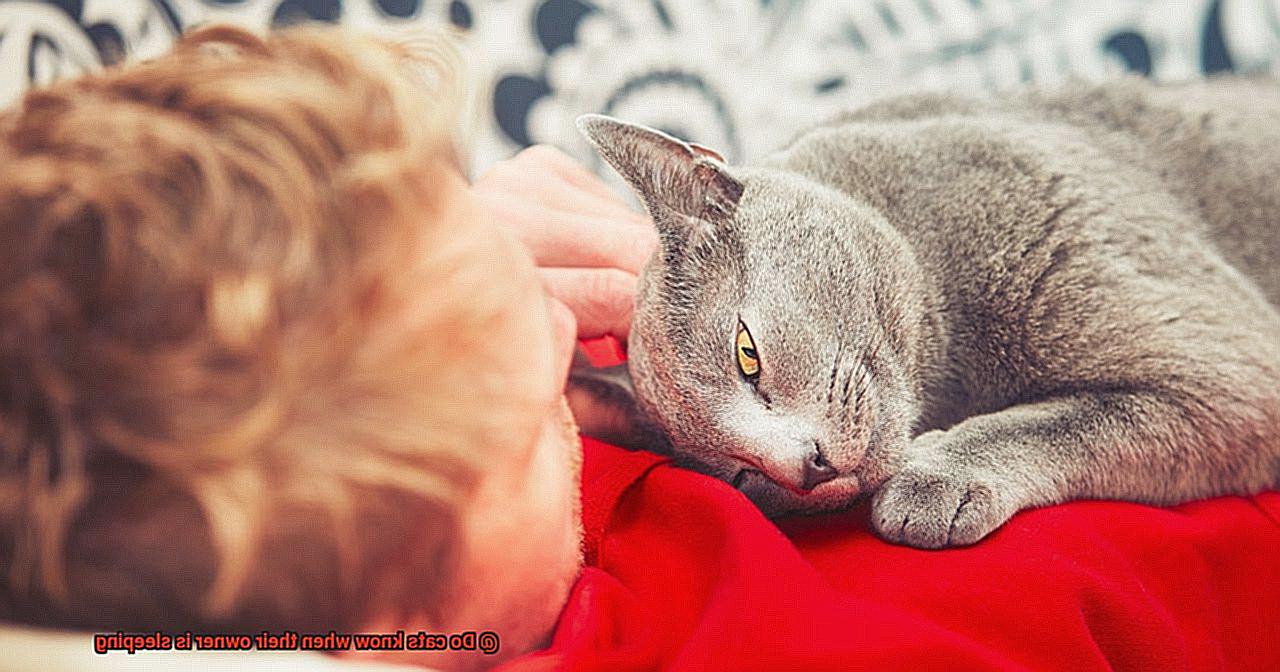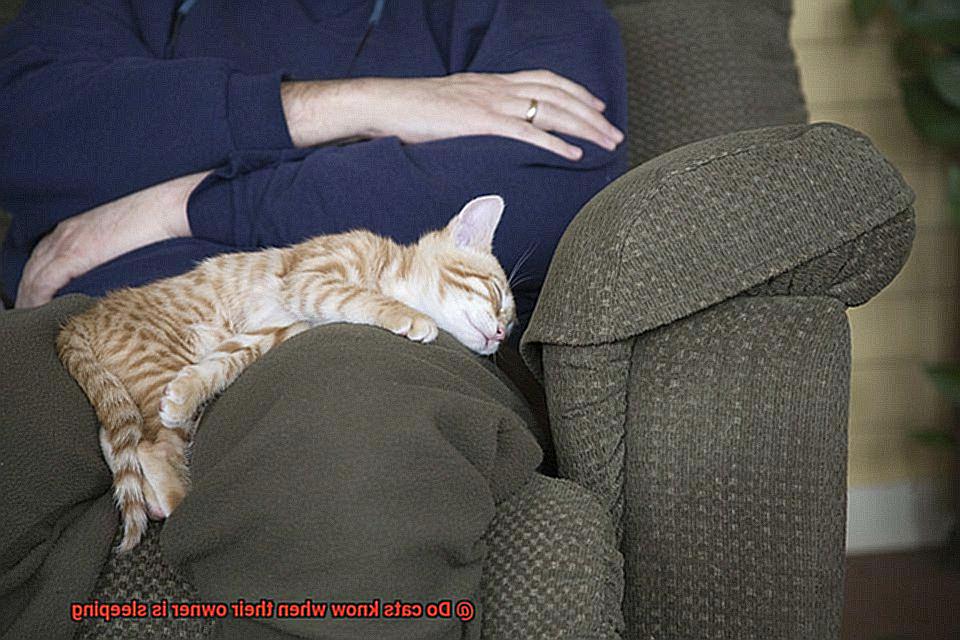Cats have been our beloved companions for centuries, and yet they remain a mystery to us. Their independent nature and aloof demeanor make them all the more intriguing. As cat owners, we often wonder if our feline friends know when we’re sleeping. Is that why they curl up next to us at night? Or are they just seeking comfort?
Recent studies suggest that cats possess an uncanny sense of awareness and a deep connection with their owners. They are highly perceptive creatures that can pick up on subtle changes in their environment, such as changes in body language and tone of voice. But can they really tell when we’re sleeping?
In this blog post, we’ll dive into the fascinating world of feline intuition and explore whether cats know when their owner is sleeping. We’ll take a closer look at their behavior patterns and examine the scientific evidence that sheds light on this curious question. From their heightened senses to their instincts, we’ll uncover the mysteries behind your furry friend’s sleeping habits.
So sit back, relax, and get ready to discover the truth about your cat’s nocturnal behavior. Whether you’re a seasoned cat owner or just curious about feline behavior, this post is sure to provide some fascinating insights into your furry friend’s world.
What Do Cats Know?
Cats have been domesticated for thousands of years, and their reputation for being aloof and independent is well-known. However, these intelligent creatures are also highly observant and pay close attention to their surroundings, including the activities of their human companions. So, what exactly do cats know?
Studies have shown that cats have an impressive ability to understand and interpret human behavior. They can read subtle cues such as body language, facial expressions, and vocal tones to determine how their owners are feeling and what they might need at any given moment. This means that cats are not only aware when their owners are sleeping but also understand the importance of rest.
One reason why cats may be able to detect when their owners are sleeping is through their incredible sense of hearing. Cats have ears that are sensitive to high-frequency sounds and can hear from much farther away than we can. This allows them to detect even the slightest movements or noises made by their sleeping owners.

In addition to their acute sense of hearing, cats also rely heavily on their sense of smell to navigate the world around them. They use scent markers to identify familiar objects and locations, including their owners’ beds and sleeping areas. This means that even if a cat cannot see or hear its owner sleeping, it may still be able to detect their scent and know that they are nearby.
Cats are also highly protective of their owners, and this instinct kicks in when we’re sleeping. They may stay awake or keep watch over us until they sense that everything is safe. This is yet another sign of how much our cats care for us and want us to be safe at all times.
Furthermore, cats are creatures of habit and routine, and they quickly learn the daily routines and habits of their human companions. They know when it’s time to eat, play, or rest, and they will often remind us if we forget. This level of intelligence and understanding is truly fascinating and speaks to the unique bond between humans and their feline companions.
Cats and Sleep Patterns
If you’ve ever observed your furry feline friend, you may have noticed that they seem to spend most of their day snoozing. In fact, cats are known for sleeping more than half of the day. However, what’s fascinating is that their sleep patterns are quite different from ours.
Cats have a unique sleep cycle that involves several stages, including light sleep, deep sleep, and REM (Rapid Eye Movement) sleep. During the light sleep stage, cats are easily roused and may wake up if they hear any noises or movements. The deep sleep stage, on the other hand, is when cats are in a much deeper state of slumber and less likely to wake up easily.
But what makes our feline friends even more remarkable is their ability to adapt their sleep patterns according to their owners’ habits and routines. Research has shown that cats are highly perceptive creatures who can pick up on subtle cues such as changes in activity levels and the sound of their owner’s breathing.
This ability is likely due to their keen senses and instincts as hunters in the wild. Cats must always be alert to their surroundings and able to respond quickly to any changes or threats. As such, they have evolved to be incredibly observant creatures who can detect even the slightest changes in their environment.

So, what does this mean for you as a cat owner? It means that your cat is likely paying close attention to your habits and routines, including your sleep patterns. If you tend to go to bed early and wake up early, your cat may also adapt to this schedule and sleep during the same hours. On the other hand, if you tend to stay up late and sleep in, your cat may do the same.
But it’s not just about adapting to your schedule. Cats also have different stages of sleep that allow them to be more or less responsive to their environment. During the day, when you’re likely to be active, your cat will likely spend more time in light sleep so that they can be alert to any changes in their surroundings. At night, when things are quieter, they’ll spend more time in deep sleep.
Cats’ Keen Senses
Firstly, cats have an acute sense of hearing that allows them to pick up on even the faintest sounds. This means that if you’re snoring softly or breathing heavily while asleep, your cat can quickly detect these sounds and know that you’re in a deep slumber. They’re listening to your every breath.
Secondly, cats have an incredible sense of smell that humans cannot even perceive. When we sleep, our bodies emit different scents that cats can identify and associate with sleep. So if your cat sniffs your scent while you’re lying down, they may assume that you’re sleeping peacefully.
Lastly, cats’ keen sense of sight also plays a role in determining whether their owner is asleep or awake. Cats are known for being able to see well in low light conditions, and they can detect subtle body movements even in the dark. Therefore, if you’re lying still in bed with closed eyes, your cat may assume that you’re catching some zzz’s.
Cats Curling Up With Owners

There’s nothing quite like the feeling of a warm, cuddly cat snuggling up next to you at night. As an expert on all things feline, I can tell you that there are several reasons why cats love to curl up with their owners.
Firstly, cats have an incredible ability to sense changes in their owner’s behavior. Their acute hearing and sense of smell allow them to detect subtle shifts in movement and scent that indicate a deep sleep. This prompts them to curl up next to their owner, seeking warmth and comfort.
But it’s not just about physical comfort. Cats are social creatures who thrive on companionship, and sleeping with their owner provides them with the affection and closeness they crave. In fact, studies have shown that petting a cat can lower your blood pressure and reduce stress levels, making for a more restful night’s sleep for both you and your furry friend.
Another reason why cats may prefer to sleep with their owners is for security. Despite being predators by nature, cats are also prey animals and can feel vulnerable in certain situations. Curling up next to you at night may provide them with a sense of safety and protection from potential dangers.
It’s also worth noting that cats are creatures of habit and routine, so sleeping with their owner may simply be part of their daily ritual. They may associate your presence with feelings of comfort and security, making it a natural choice for them to snuggle up next to you at bedtime.
Natural Instinct to Protect Owners
For a cat, knowing their owner’s sleep habits is crucial. They learn the sound of their breathing, the feel of their body heat, and the scent of their presence as they sleep. This gives them the ability to monitor their owner’s safety and well-being while they rest. In some cases, cats may even become territorial over their sleeping owner. To them, their owner is part of their territory, and they won’t hesitate to defend them against any perceived threat.
Cats have a natural instinct as predators and defenders of their territory, and this includes protecting their sleeping owner. They can pick up on subtle changes in their environment, such as strange noises or unfamiliar smells, which might indicate a potential danger to their beloved human.
However, it’s important to remember that not all cats display this behavior. Some may be more independent or aloof and may not show much interest in their owner’s sleep habits. Additionally, each cat has its unique personality and may react differently depending on the situation or individual owner.

Nevertheless, it’s comforting to know that your furry friend is keeping watch over you as you rest. Cats have been known to sense illness or danger in humans before we even recognize it ourselves. So next time your cat snuggles up to you at night, know that they are fulfilling their natural instinct to protect and defend their beloved owner.
Benefits of Sleeping With a Cat
Look no further than your furry feline friend. Sleeping with a cat can provide numerous benefits that go beyond just a cozy snuggle buddy.
The first benefit of sleeping with a cat is their calming presence. The sound of a cat’s purring has been shown to have therapeutic effects on their owners, reducing stress and anxiety levels. Additionally, petting your cat while they purr can release feel-good hormones like serotonin and oxytocin, promoting relaxation and contentment.

Cats are also natural hunters with excellent senses, providing a sense of safety and security when sleeping near their owners. Some cat owners even report feeling safer with their cats around than with traditional security measures like alarms or locks. Plus, sharing a sleep schedule with your furry friend can help regulate your own sleep patterns for a more consistent and restful night’s sleep.
And let’s not forget about the bond between owner and pet. Cats are social creatures who love spending time with their humans, and sleeping together can deepen the sense of closeness and intimacy between you and your feline companion.
However, it’s important to remember that not all cats enjoy sleeping in bed with their owners. It’s crucial to respect your cat’s preferences and boundaries as a responsible pet owner. Some cats may prefer to sleep alone or in their own designated sleeping areas.

Tips for Creating a Safe and Comfortable Environment for Your Cat
Creating a safe and comfortable environment for your feline friend is important to their overall well-being. Here are five tips to help you achieve this.
Tip 1: Provide a Cozy Sleeping Area
Cats love to sleep in warm and comfortable places, so make sure your cat has a designated sleeping area that is cozy, clean, and quiet. A good cat bed should be soft, warm, and cozy. You can choose from a variety of options, including traditional cat beds, heated beds, and even hammocks. It’s important to choose a bed that suits your cat’s needs and preferences. If you have multiple cats, make sure each one has their own bed or space to sleep in.
Tip 2: Keep the Litter Box Clean
A dirty litter box can be stressful for cats and can cause health problems. Make sure you clean the litter box regularly and keep it in a quiet and private area. Cats prefer privacy when using the litter box, so make sure it’s in an area where they can be alone. It’s also important to use unscented litter as cats have sensitive noses.

Tip 3: Offer Plenty of Scratching Posts
Scratching is a natural behavior for cats, and they need to scratch to keep their claws healthy. Provide your cat with plenty of scratching posts or pads to help them satisfy their natural urge to scratch. This will also prevent them from scratching your furniture. Choose scratching posts made of different materials such as sisal rope or cardboard to provide variety for your cat.
Tip 4: Provide Fresh Water and Food
Cats need access to fresh water and food at all times. Make sure you provide them with clean water and quality cat food that meets their nutritional needs. You can also add some variety to their diet by offering treats or wet food. It’s important to wash their food and water bowls regularly to prevent bacteria buildup.
Tip 5: Keep Dangerous Items Out of Reach
Cats are curious creatures, and they love to explore their surroundings. Make sure you keep toxic substances, sharp objects, and other dangerous items out of reach to prevent accidents. This includes keeping household cleaners, medications, and small objects that can be swallowed away from your cat. It’s also important to secure windows and doors to prevent your cat from escaping or falling.
Signs That Your Cat is Not Feeling Safe or Comfortable
As their caretaker, it’s important to understand the signs that your cat is not feeling safe or comfortable. Here are some behaviors to watch out for:
- Firstly, hiding or avoidance behavior is a clear indication that your cat is feeling threatened or anxious. If your feline friend starts hiding or avoiding you altogether, it’s time to investigate further.
- Secondly, aggressive behavior is another sign of discomfort. Cats may become aggressive if they feel threatened or uncomfortable, which can include hissing, scratching, biting, or even growling.
- Thirdly, excessive grooming can also indicate that your cat is anxious. Although cats groom themselves as a way to self-soothe and relieve stress, excessive grooming could be a sign of underlying anxiety.
- Fourthly, a sudden loss of appetite is a major concern. Cats are known for being picky eaters, but if your cat stops eating altogether, it could be an indication that they are not feeling well or comfortable in their surroundings.
- Lastly, litter box issues can signal that your cat is not feeling safe or comfortable. If your cat suddenly starts having accidents outside of their litter box, it could be a sign that they are stressed or uncomfortable in their environment.
s
If you notice any of these indicators of discomfort in your cat’s behavior, it’s crucial to identify the source of their unease and take steps to make them feel more secure in their environment. It’s also essential to consult with your veterinarian or a certified animal behaviorist for additional guidance and support.
qwVu468fFq0″ >
Conclusion
In conclusion, cats are truly remarkable animals with an exceptional ability to perceive and respond to human behavior. Recent research has shown that cats possess a heightened awareness of their owner’s movements, even when they are asleep. Their acute senses and instincts enable them to detect changes in body language and tone of voice, making them incredibly intuitive creatures.
Moreover, cats have a unique sleep cycle that allows them to adapt their patterns according to their owner’s routine. They may spend most of their day snoozing but are alert at night, keeping watch over their territory and protecting their sleeping owner from potential dangers.
Sharing your bed with your feline companion can be a comforting experience that provides numerous benefits beyond just having a cozy snuggle buddy. It can reduce stress levels and promote more restful sleep while deepening the bond between you and your cat.
However, it’s essential to create a safe and comfortable environment for your furry friend by providing them with cozy sleeping areas, clean litter boxes in quiet areas, plenty of scratching posts, fresh water and food at all times while keeping dangerous items out of reach. Monitoring your cat’s behavior is also crucial as it allows you to identify any signs of discomfort or anxiety.
In short, cats are not only aware when their owners are sleeping but also play an essential role in promoting restful sleep and providing companionship.







